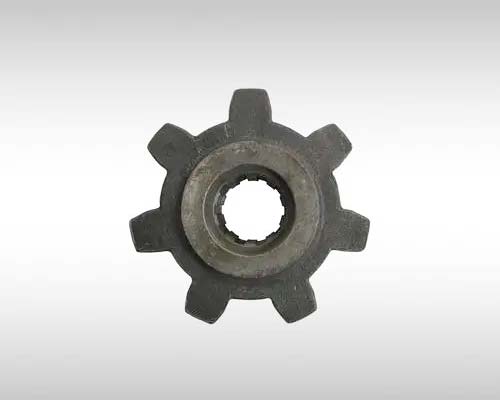- Contact Innally, Let you purchase forgings in China more favorable prices, products more assured!
- Hotline:+(86)15038323776 Email:innally@innally.com
What is the choice of sprocket forgings material?
- Category: Metal forging, Steel forgings
- |
- Date: 08/11/2023
the material selection of sprocket forgings needs to be comprehensively considered according to the use environment and performance requirements. Different materials have different advantages and scope of application, and need to be reasonably selected according to the specific situation.
Product Details
The material choice of sprocket forgings has an important influence on its performance and service life.
First, the material selection principle of sprocket forging
Strength and toughness: Sprocket forgings need to withstand a certain load and impact, so it is necessary to choose materials with sufficient strength and toughness.
Corrosion resistance: Sprocket forgings may encounter various corrosive media in the use environment, so it is necessary to choose materials with good corrosion resistance.
Wear resistance: Sprocket forgings may be subjected to friction and wear during use, so it is necessary to choose materials with good wear resistance.
Cost: Under the premise of meeting the performance requirements, the selection of affordable and resource-rich materials can reduce the production cost.

Two, common sprocket forging material types
Carbon steel: Carbon steel is a common sprocket forging material, has good strength and toughness, can meet the general transmission needs. Commonly used carbon steel including Q235, 45 steel and so on.
Stainless steel: Stainless steel has good corrosion resistance and wear resistance, suitable for sprocket forgings working in corrosive environments. Commonly used stainless steel including 304, 316 and so on.
Alloy steel: Alloy steel has good strength and toughness, suitable for high load, high impact transmission system. Commonly used alloy steels include 40Cr, 20CrMnTi and so on.
Copper alloy: Copper alloy has good corrosion resistance and wear resistance, suitable for light load, low speed, no impact transmission system. Commonly used copper alloys include H68 brass, aluminum bronze, etc.
Aluminum alloy: Aluminum alloy has the advantages of light weight, good corrosion resistance, etc., suitable for light load, high speed, no impact transmission system. Commonly used aluminum alloys include 5052 aluminum alloys.
In summary, the material selection of sprocket forgings needs to be comprehensively considered according to the use environment and performance requirements. Different materials have different advantages and scope of application, and need to be reasonably selected according to the specific situation.
nannan
INNALLY mainly provides you with various types of cast and forged parts products. Welcome your inquiries! innally@innally.com
Related Products
Search
Forging center
- Steel forgings
- Aluminium alloy forging
- Titanium alloy forging
- Stainless steel forging
- Copper forging
- Automotive forgings
- Locomotive forging
- Bicycle forgings
- Motorcycle forging
- Rigging and fasteners
- Bearing forging
- Electric power fittings
- Marine forging
- Mechanical forgings for metalworking
- Mining machinery forgings
- Marine engineering forgings
- Construction machinery forgings
Popular product

© 2025. All Rights Reserved.






